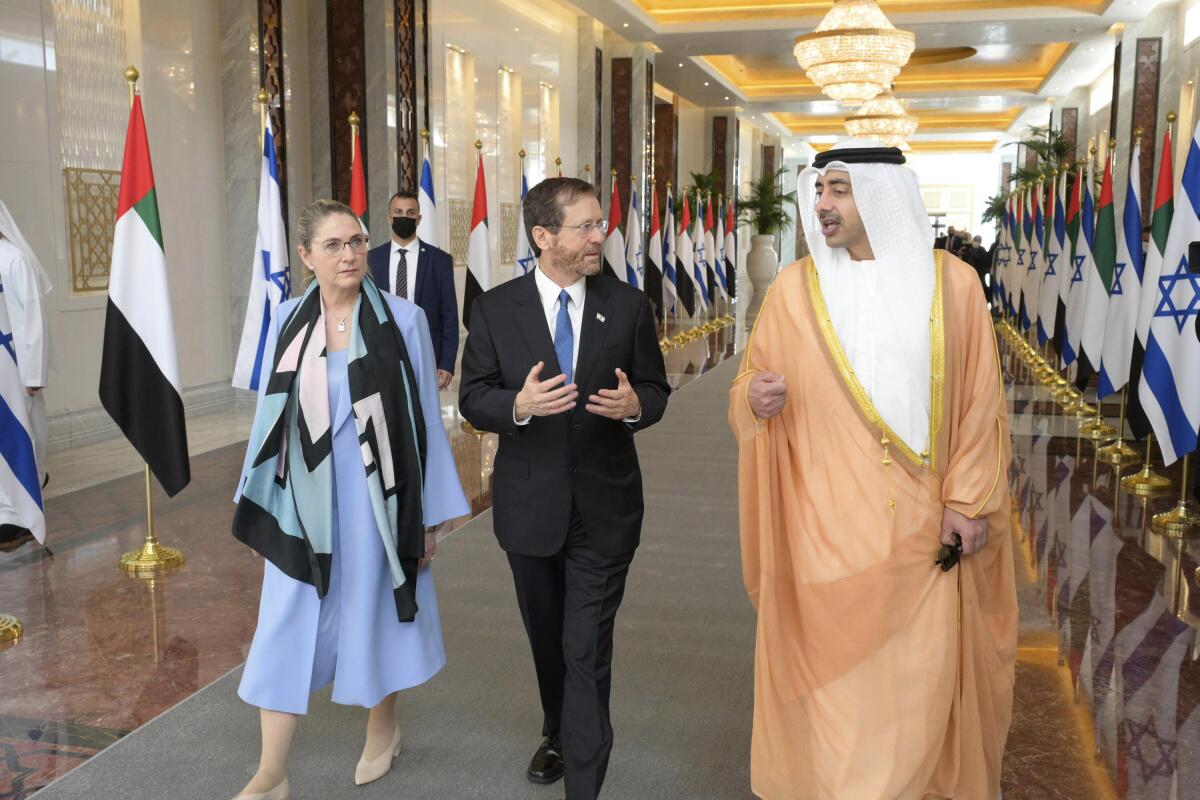UAE intercepts Yemen missile as Israeli president visits

- Share via
DUBAI, United Arab Emirates — The United Arab Emirates intercepted a ballistic missile fired by Yemen’s Houthi rebels early Monday as the Israeli president visited the country, authorities said, the third such attack in recent weeks.
The missile fire further escalates tensions across the Persian Gulf, which previously had seen a series of assaults near — but never indisputably on — Emirati soil. It comes during Yemen’s years-long war and the collapse of Iran’s nuclear deal with world powers.
The UAE’s state-run WAM news agency reported the interception, saying that “the attack did not result in any losses, as the remnants of the ballistic missile fell outside the populated areas.”
It wasn’t immediately clear where the missile remnants fell. The country’s civilian air traffic control agency said there was no immediate effect on air travel in the UAE, home to the long-haul carriers Emirates and Etihad.
Already, the country’s top prosecutor has threatened that people who film or post images of such an incident would face criminal charges in the UAE, an autocratic federation of seven sheikhdoms on the Arabian Peninsula. That makes reporting on such incidents even more complicated for journalists.
In the email exchange, armorer Hannah Gutierrez Reed said she couldn’t simultaneously focus on two roles: “That’s when mistakes get made.”
In the absence of those videos, the Emirati Defense Ministry released black-and-white footage it described as showing the destruction of a ballistic missile launcher in Yemen’s Jawf province some 30 minutes after the attack. Another attack last week saw a similar strike launched on Jawf in the minutes after, leading analysts to suggest the Emiratis may be receiving intelligence assistance from the West for its strikes.
Jawf is about 840 miles southwest of Abu Dhabi.
Houthi military spokesman Yehia Sarei wrote on Twitter that the rebels would make an announcement about an attack in the coming hours that reached into “the depths of the UAE.” He did not elaborate and there was nothing immediately reported on the Houthis’ Al Masirah satellite news channel.
Israeli President Isaac Herzog is in the country on a state visit. The ceremonial leader met Sunday with Abu Dhabi’s powerful crown prince, Sheikh Mohammed bin Zayed al Nahyan.
Herzog’s office later told the Associated Press that the trip was “expected to continue as planned” when asked about the missile interception. It did not elaborate. Herzog was scheduled to visit Dubai’s Expo 2020 world’s fair Monday, which the Houthis had previously threatened to target.
Last week, a similar attack saw both Emirati and U.S. forces fire interceptor missiles to bring down down a Houthi attack.
The week before that saw a Houthi drone-and-missile attack strike an Abu Dhabi National Oil Co. fuel depot, killing three people and wounding six others. Another attack targeted Abu Dhabi International Airport, though damage wasn’t seen in satellite photos analyzed by AP. That attack came as South Korean President Moon Jae-in visited the Emirates.
Although the UAE has largely withdrawn its own forces from Yemen, it is still actively engaged in the conflict. It supports militias fighting the Houthis, who seized Yemen’s capital, Sana, in September 2014.
The missile attacks targeting the UAE come as the Houthis face pressure and are suffering heavy losses on the battlefield. Yemeni government forces, allied and backed by the UAE, have pushed back the rebels in key provinces. Aided by the Emirati-backed Giants Brigades, the government forces took back the province of Shabwa earlier this month in a blow to Houthi efforts to complete their control of the entire northern half of Yemen.
While Emirati troops have been killed over the course of the conflict, until this month the war hadn’t directly affected daily life in the wider UAE, a country with a vast foreign workforce.
More to Read
Sign up for Essential California
The most important California stories and recommendations in your inbox every morning.
You may occasionally receive promotional content from the Los Angeles Times.











